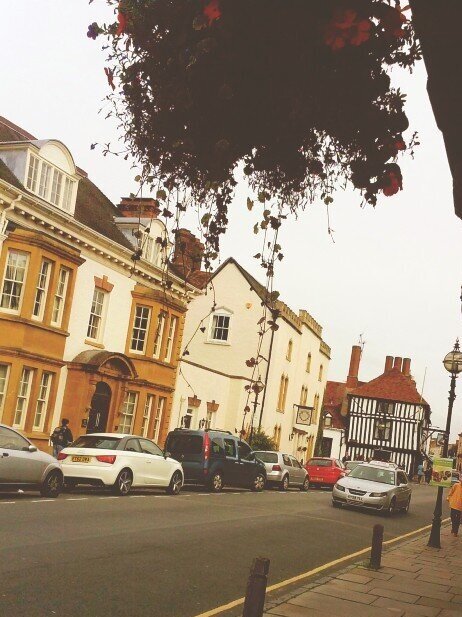A Country Expedition to Stratford-Upon-Avon and Kenilworth Castle
This post originally appeared on CAPA World Blog on October 16, 2015.
As a child, my intimations of England were all kings and queens, fairies and dragons, castles and moats. As an adolescent, fueled with the romantic vestiges of Austen, Hardy, Dickens and the Brontës, those imaginings shifted to visions of moors and manor houses, poets and playwrights, country lanes and cottages, gowns and balls.
In twenty-first-century London, I have been unable to find any remnants of the idealized England of my literary fantasies, admittedly because those fantasies have sprung from either long-past history or plain fiction.
Obviously, I didn't really expect my experience here to be like a fairy tale or a Jane Austen novel. Still, I can't help looking around every now and then and trying to force myself to reconcile my surroundings with my imagination, to realize that this is what it's really like — this is the real England.
And because I've pictured it for so long, in so many different ways, sometimes I also can't help but feel a little disappointed if things here don't turn out to be exactly what I thought they were. But all I needed to remedy that was a little trip to the countryside.
Kenilworth Castle, Warwickshire, England
Last Sunday, CAPA set out on an excursion to Stratford-Upon-Avon, the birthplace of William Shakespeare, and Kenilworth Castle, the home of Robert Dudley, First Earl of Leicester and suitor of Queen Elizabeth I. With my love of literature, drama and history, this was the perfect outing to stir my imagination, bolster my spirits and rekindle my excitement for being in this country. A breather from the city can be a welcome respite, and a glimpse of the beauty of the countryside and the rich history of the nation were just what I needed.
Stratford-Upon-Avon, the birthplace of William Shakespeare
The green fields of the midlands are hedged, rolling and dotted with the soft forms of hundreds of black and white sheep, and from the window of the coach bus they looked like the England of my imagination. As we made our way down a tree-dappled lane and pulled into the small village of Stratford-Upon-Avon, the enchantment continued.
I found myself weaving down cobbled streets between refurbished Tudor houses that saw Shakespeare and John Harvard through their school days. I stood in the graveyard of the little church where Shakespeare was buried, where his final words read "cursed be he that moves my bones," and I stepped upon the creaky floors and narrow stairs in the house where he was born and raised.
In the gardens outside, impromptu Shakespeare reciters shouted well-known verses to a semicircle of tourists. Cakes, baguettes and cashmere scarves lined the windows of the colorful shops on Henley Street. It couldn't have been more picturesque.
Half an hour north, over more rugged country, Kenilworth Castle was even more striking. The autumn afternoon had grown brisk and blustery, and the craggy ruins of the once-magnificent castle peered over the tips of slowly-changing trees from its lonely perch on the hill.
Although it had been battered and partially destroyed in the War of the Roses, its proud remnants stood strong and tall, and its surroundings were unspoiled by man or modernization — all that could be seen from its decaying turrets were miles of wild, stormy forests, windblown fields and interspersed herds of cattle. It was the first castle I've ever seen in person, and I felt like I'd been waiting my whole life to stand in awe of its mysterious beauty.
Kenilworth Castle and Elizabethan Gardens
As I stepped through the arbors and down the paths of its Elizabethan gardens, climbed the spiraling stairs of its crumbling towers and stood in the remains of chambers and halls that had once felt the footfalls of the Virgin Queen, I felt an invisible tie to the distant past and the whispers of the fictions I loved so well.
They didn't seem so impossible here, the kingdoms and dragons, the magic and battles, the carriages and stormy romances and long walks across moors. The wind seemed to carry echoes of things real and imaginary, and I could see them all from the battlements, dancing across the untamed fields.
This was the England I imagined, after all.





